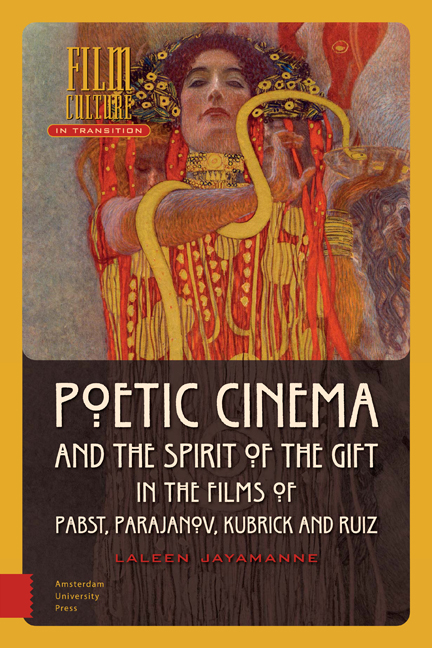Book contents
- Frontmatter
- Dedication
- Contents
- Foreword: In Memory of Thomas Elsaesser
- Introduction: Spirit of the Gift: Cinematic Reciprocity
- 1 A Gift Economy: G. W. Pabst’s Pandora’s Box (1929)
- 2 Fabric of Thought: Sergei Parajanov
- 3 Nicole Kidman in Blue Light: Stanley Kubrick’s Eyes Wide Shut (1999)
- 4 Ornamentation and Pathology: Raúl Ruiz’s Klimt (2006)
- Afterword: Poetics of Film Pedagogy
- Bibliography
- Filmography
- About the Author
- Index
4 - Ornamentation and Pathology: Raúl Ruiz’s Klimt (2006)
Published online by Cambridge University Press: 13 April 2021
- Frontmatter
- Dedication
- Contents
- Foreword: In Memory of Thomas Elsaesser
- Introduction: Spirit of the Gift: Cinematic Reciprocity
- 1 A Gift Economy: G. W. Pabst’s Pandora’s Box (1929)
- 2 Fabric of Thought: Sergei Parajanov
- 3 Nicole Kidman in Blue Light: Stanley Kubrick’s Eyes Wide Shut (1999)
- 4 Ornamentation and Pathology: Raúl Ruiz’s Klimt (2006)
- Afterword: Poetics of Film Pedagogy
- Bibliography
- Filmography
- About the Author
- Index
Summary
Abstract
Raul Ruiz's film on Klimt and Gustav Klimt's own work are examined in terms of a cluster of related ideas; namely allegory, fragmentation, and ornamentation. Modern allegory, whether cinematic or painterly, is shown to have powers of fragmenting organic forms. Similarly, modern ornamentation is elaborated as a power to dematerialize solid forms reaching towards the infinitesimal in perception. Through these devices of allegorical ornamentation, the Ruizean cinematic image and sound are imbued with polysemia and corresponding pathic sates of intensity. The role of the cinematic closeup in facilitating these processes of fragmentation is also examined. The multi-ethnic polity of fin-dè-siecle Vienna on the brink of its dissolution is perceived through the aesthetic optic of a delirious Klimt on his deathbed.
Keywords: Raul Ruiz's Klimt, Cinematic allegory, Ornament and pathology, Fragment and close-up, Fin-de-siècle Vienna
Who art thou? asked the guardian of the night
From crystal purity I come, was my reply,
And great my thirst, Persephone,
Yet heeding thy decree I take to flight
And turn and turn again, forever right.
I spurn the pallid Cyprus tree,
And take no refreshment at its Sylvan spring,
But hasten on toward the rustling river
Of Mnemosyne, wherein I drink to sweet satiety.
And there dipping my palms between the
Knots and loopings of its mazy stream
I see again, as in a drowning swimmers dream,
All the strange sights I ever saw,
And even stranger sights no man has ever seen.
Klimt
This poem, a pastiche (a sonnet of sorts), written for Raúl Ruiz's film Klimt, is heard in voice-over, recited by John Malkovich, in the very last shot of the film – a coda that shows Klimt holding a glass of water, from which he drinks as a shower of coloured flower petals rain down on him. His expression appears to be one of quiet delight at the cascading petals. He and his voice seem to yield to their softness. It is a posthumous image. All through the film we have intermittently returned to Klimt's deathbed in a hospital, where he lies semi-conscious, uttering just one word: ‘Flowers.’ The entire film may be viewed in part as the vision of ‘a drowning swimmer's dream’, just on the threshold of death. The poem appears to be an ode to the cinematograph itself.
- Type
- Chapter
- Information
- Poetic Cinema and the Spirit of the Gift in the Films of Pabst, Parajanov, Kubrick and Ruiz , pp. 127 - 152Publisher: Amsterdam University PressPrint publication year: 2021



